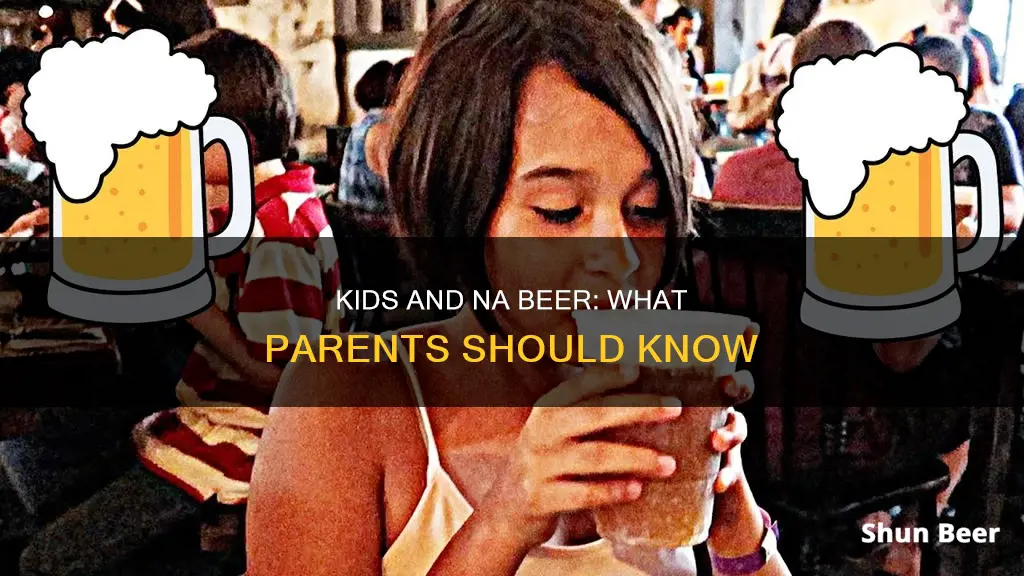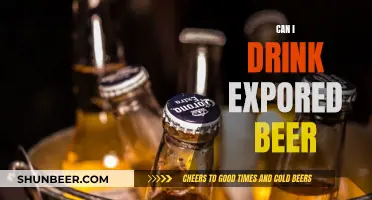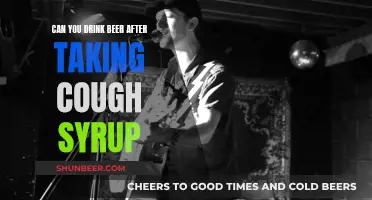
Actress Kristen Bell has received criticism for allowing her children, aged 8 and 9, to drink non-alcoholic beer. While the law in the US states that minors under the age of 21 can consume non-alcoholic beverages, there are physical health risks associated with children drinking non-alcoholic beer, including an increased risk of addiction and normalising drinking behaviour.
What You'll Learn

Non-alcoholic beer is not alcohol-free
Non-alcoholic beer is often assumed to be completely alcohol-free, but this is not always the case. While it is true that non-alcoholic beers have a much lower alcohol content than conventional beers, they can still contain small amounts of alcohol. In the United States, beverages containing less than 0.5% alcohol by volume (ABV) can be labelled as "non-alcoholic". This means that a non-alcoholic beer could contain up to 0.4% ABV, which is still alcohol, albeit a very small amount.
The threshold for non-alcoholic beverages in the US is set at 0.5% ABV, which is similar to the amount of alcohol found in some fruit juices, breads, and ripe bananas. While this low percentage of alcohol is not enough to cause intoxication or a hangover, it is still important to be aware that non-alcoholic beers are not always entirely alcohol-free. This distinction is particularly important for individuals who are sensitive to even trace amounts of alcohol, such as recovering alcoholics or those with religious restrictions.
The presence of alcohol in non-alcoholic beers can be a result of the brewing process. Brewers often use controlled fermentation methods, which involve cutting off the fermentation process before it is complete to limit the percentage of ABV. However, this can still leave trace amounts of alcohol in the final product. Other brewers may use dealcoholization methods, such as heating the alcohol to its boiling point or using vacuum distillation, to remove as much alcohol as possible.
The perception that non-alcoholic beers are completely alcohol-free can have significant implications, especially for minors and individuals in recovery from substance use disorders. While the law in many places permits minors to consume non-alcoholic beverages, it is important to be aware that these drinks may still contain small amounts of alcohol. This can be confusing for children and teens, who may not fully understand the difference between alcoholic and non-alcoholic drinks. Additionally, normalizing the consumption of beer products at a young age could increase interest in and accessibility to alcoholic beverages later on.
For individuals in recovery from substance use disorders, the presence of alcohol in non-alcoholic beers can be triggering and may increase the risk of relapse. Even the smell or taste of beer can lead to cravings and potential relapse, so it is generally recommended that recovering alcoholics avoid non-alcoholic beers altogether and choose alternative beverages that do not resemble alcohol.
Invisalign and Beer: Is It Safe?
You may want to see also

It's generally legal for kids to drink NA beer
It is generally legal for kids to drink NA beer. However, it is important to note that the legal implications vary depending on location. While the National Minimum Drinking Age Act sets the legal age for purchasing or publicly consuming alcohol in the United States at 21, there are several exceptions and state-based variations.
In 26 states, minors are permitted to consume alcohol as part of a religious service or ceremony. Additionally, minors working in the food and beverage industry may be able to purchase alcohol for work-related purposes but are typically not allowed to drink it themselves. In certain states, exceptions are made for educational purposes, lawful employment, parental consent, and law enforcement operations.
Despite these exceptions, it is crucial to emphasize that alcohol can have detrimental effects on children's health and well-being. Even a small amount of alcohol can lead to dangerous consequences such as low blood sugar, seizures, coma, and problems regulating body temperature. Repeated exposure to alcohol during childhood can also interfere with brain development and increase the likelihood of excessive drinking in adolescence. Therefore, while it may be legal in certain circumstances for kids to drink NA beer, it is essential to prioritize their safety and well-being by abstaining from providing them with any alcoholic beverages.
To ensure the well-being of children, it is recommended to model healthy habits and communicate your disapproval of underage drinking. By setting clear rules and sharing your expectations, you can foster a healthy attitude toward alcohol consumption and help prevent your child from engaging in risky behaviors. Additionally, it is crucial to keep alcoholic beverages out of the reach of children and to be mindful of products that may contain alcohol, such as mouthwash and cosmetics.
The Art of Distilling: Brewing Beer, Simplified
You may want to see also

But some states have their own laws
While the federal law permits minors to consume non-alcoholic beverages, some states have their own laws that restrict this.
In North Carolina, it is legal for minors under 21 to drink non-alcoholic beer, as long as it contains less than 0.5% alcohol. However, some stores may have their own policies and choose not to sell non-alcoholic beer to minors. In Mississippi, North Dakota, and Ohio, only those 18 and older are allowed to drink non-alcoholic beer. In Ohio, the minimum age to purchase non-alcoholic beer is also 18.
Additionally, 14 states prohibit minors from drinking non-alcoholic beer. For example, Kansas prohibits the consumption of any "cereal malt beverage" that has undergone fermentation, which would include most non-alcoholic beers.
These state-level variations highlight the importance of checking local and state laws to understand the specific regulations governing the consumption and purchase of non-alcoholic beer by minors.
The differing laws across states reflect the ongoing debate about the potential risks and benefits of minors consuming non-alcoholic beer. While some argue that it can increase interest in consuming alcoholic beverages and normalise drinking, others contend that it is a safer option that allows minors to experience the taste of beer without the harmful effects of alcohol. Ultimately, the decision rests with parents and guardians, who must weigh the available information and make an informed choice for their children.
Hand-Pulled Beer Pumps: Traditional, Unique, and Fun!
You may want to see also

Pediatricians warn of health and addiction risks
While non-alcoholic beer is often marketed as a harmless alternative to conventional beer, pediatricians and health experts have warned that allowing children and teens to consume these beverages may carry health and addiction risks.
Normalising Alcohol Consumption
One of the primary concerns raised by pediatricians is that exposing children to non-alcoholic beer may normalise alcohol consumption and increase their interest in trying alcoholic beverages. Research has shown that teens who have consumed non-alcoholic beer are more inclined to drink alcohol. Pediatrician Dr. Chloe Campbell cautions that allowing kids to drink non-alcoholic beer is akin to planting the seed that "beer drinking is OK," which may lead to underage drinking. The ritual of drinking beer, even in its non-alcoholic form, can be especially risky for children with a family history of substance misuse disorder, as it may increase their genetic predisposition to develop substance use disorders.
Confusion and Dangerous Consequences
Non-alcoholic beer can also confuse children, who may not fully understand the difference between alcoholic and non-alcoholic drinks. This confusion can lead to dangerous consequences if a child accidentally consumes an alcoholic beverage, mistaking it for a non-alcoholic one. Additionally, the bitter taste of hops in non-alcoholic beer can familiarise children with the flavour, leading to riskier alcohol use later in life.
Long-term Health Impact
While the immediate health impact of non-alcoholic beer on children may be negligible, pediatricians warn of potential long-term consequences. These beverages often contain calories and carbohydrates, similar to sodas and other sugary drinks, which can contribute to unhealthy dietary habits. Furthermore, scientific evidence suggests that early exposure to alcohol, even in small amounts, can be a risk factor for alcohol dependence in adulthood.
Misleading Marketing and Parental Unawareness
The line between alcoholic and non-alcoholic beer is often blurred, with many non-alcoholic beers containing trace amounts of alcohol (up to 0.5% ABV). This grey area is further complicated by the marketing of these beverages, which often targets younger audiences and portrays them as soft drinks. This misleading marketing contributes to a lack of awareness among parents about the potential harm these products can cause. In some cases, parents may unintentionally serve non-alcoholic beers to their children, believing them to be harmless alternatives.
In conclusion, while non-alcoholic beer may be legally consumed by minors in many places, pediatricians and health experts emphasise the potential risks associated with this practice. The normalisation of alcohol consumption, confusion about alcoholic content, long-term health impacts, and misleading marketing all contribute to a complex issue that warrants careful consideration by parents and caregivers.
Beer and Blood Work: Can You Drink Before?
You may want to see also

It may increase interest in alcoholic drinks
Actress Kristen Bell revealed in 2023 that her daughters, aged 8 and 9, enjoy non-alcoholic beer, and even order it in restaurants. This sparked a debate about the potential risks of children consuming non-alcoholic drinks. While non-alcoholic beer is not prohibited for minors in most states, paediatricians have warned that it could increase their interest in alcoholic drinks.
Research has shown that adolescents who consume non-alcoholic beer are more likely to develop an interest in consuming alcoholic beverages. This is because drinking beer, even if it's non-alcoholic, is presented as acceptable behaviour for young people. This could lead to children wanting to try alcoholic drinks, as they may not fully understand the difference between the two types of beverages.
Dr Chloe Campbell, a paediatrician at Salem Hospital in Salem, Massachusetts, said: "We plant the seed in young minds that beer drinking is OK, it may lead to beer drinking at a young age. Maybe a kid will say, 'let me try Mommy's beer when parents are out of sight'."
The normalisation of drinking beer at a young age can be confusing for children, who may not grasp the distinction between alcoholic and non-alcoholic drinks. This could lead to dangerous situations, such as children accidentally consuming alcoholic beverages.
Additionally, Dr Marc Auerbach, a paediatric emergency medicine specialist at Yale University School of Medicine, emphasised that genetic and environmental factors play a role in the development of substance use disorders. Introducing the ritual of drinking beer, even non-alcoholic beer, could increase the risk for children who have a genetic predisposition to substance misuse.
Therefore, while non-alcoholic beer may not have immediate health consequences for children, there are potential long-term dangers associated with its consumption. Normalising alcohol use at a young age could increase the risk of developing unhealthy drinking habits later in life.
Beer and Weight Loss: Is It Possible to Have Both?
You may want to see also
Frequently asked questions
In the US, the National Minimum Drinking Age (NMDA) Act of 1984 states that anyone under the age of 21 cannot purchase alcoholic beverages. However, the Act defines "alcoholic beverages" as those containing more than 0.5% ABV. Therefore, NA beer, which typically contains less than 0.5% ABV, is not considered an alcoholic beverage and can be consumed by minors. Nevertheless, state laws vary, and some states, like Mississippi, North Dakota, and Ohio, only permit the consumption of NA beer by those 18 and older.
While NA beer does not cause intoxication, pediatricians warn that it could increase the risk of addiction and normalize drinking for children. Research suggests that teens who consume NA beer are more interested in trying alcoholic beverages. Additionally, NA beer contains calories and carbohydrates, similar to sodas and other sugary drinks, which may not be suitable for children's health.
In the US, individuals under 21 can consume alcoholic beverages with parental consent in certain states, such as Colorado, Maryland, Montana, New York, Texas, Oregon, Washington, Wisconsin, and Wyoming. However, it is important to note that these laws vary by state, and some states prohibit any consumption of alcohol by minors, regardless of parental consent. Therefore, it is essential to check the specific laws in your state.







